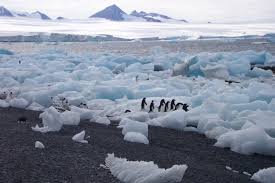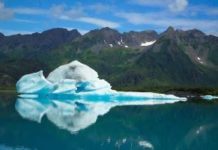 Our inability to properly address the issues of climate change, is affecting us all on a global scale. It seems as though one of the coldest places on Earth, the Arctic is beginning to melt. Large glaciers and sheets of ice in the Arctic region are heating up twice as fast as the rest of the planet. Elevated temperatures in this area are cause for serious concerns. The melting ice in the Arctic leads to elevated sea levels and the thawing permafrost often amplifies the warming effect, exacerbating an already difficult problem.
Our inability to properly address the issues of climate change, is affecting us all on a global scale. It seems as though one of the coldest places on Earth, the Arctic is beginning to melt. Large glaciers and sheets of ice in the Arctic region are heating up twice as fast as the rest of the planet. Elevated temperatures in this area are cause for serious concerns. The melting ice in the Arctic leads to elevated sea levels and the thawing permafrost often amplifies the warming effect, exacerbating an already difficult problem.
While the rapid warming of the Arctic is unsettling, scientist have previously predicted that the Arctic would warm faster than the rest of the globe. Much of this region is ocean covered in a layer of ice. The melting ice, contributes to a dangerous cycle which amplifies the effects of global warming. The ice reflects heat, from the sun, back into space. When the ice melts, it is replaced by dark water which absorbs the beat, raising the overall temperature of the water.
The winter months are usually extremely important for the reestablishment of strong ice in colder climates. The below freezing temperatures strengthen the ice so it can withstand the warmer summer months. The last two out of three cold seasons in the North Pole were at, and at times above even above freezing temperatures. These temperatures are entirely too warm for the ice to properly recover from the warmer months. This phenomenon ultimately leads to a great loss of sheet ice and glaciers.
The negative changes occurring in the Arctic are some of the most concerning signs of climate change. Over the last 15 years the Arctic has lost over 4,400 billion tons of ice. The melting ice and rising sea levels are predicted to cause wild fluctuations in weather, which could prove dangerous for the public. Scientists also mentioned concern regarding the Arctic bomb. The ice in areas such as Alaska and Siberia contain large concentrations of carbon dioxide and methane. If the ice melts, these greenhouse gasses will be released into the atmosphere. For more information on the rising sea levels and the Arctic visit http://abcnews.go.com/Technology/wireStory/science-fast-melting-arctic-sign-bad-global-warming-49199787.





